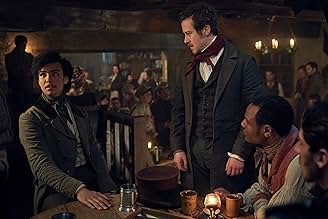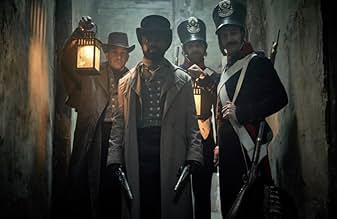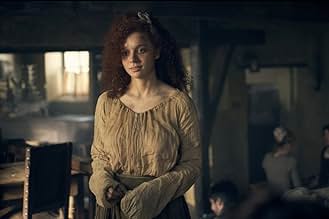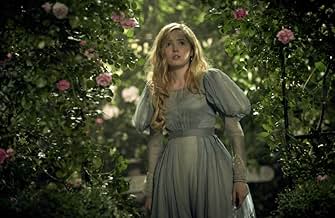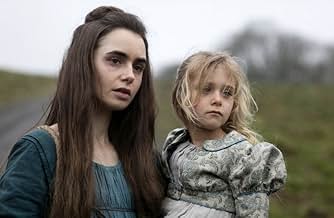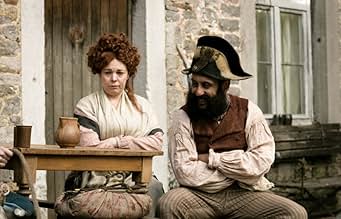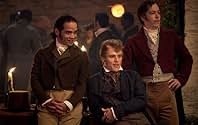Contra o pano de fundo épico da França em um momento de agitação civil, "Les Misérables" é a história de Jean Valjean, um ex-condenado incapaz de escapar da sombra de sua vida passada.Contra o pano de fundo épico da França em um momento de agitação civil, "Les Misérables" é a história de Jean Valjean, um ex-condenado incapaz de escapar da sombra de sua vida passada.Contra o pano de fundo épico da França em um momento de agitação civil, "Les Misérables" é a história de Jean Valjean, um ex-condenado incapaz de escapar da sombra de sua vida passada.
- Prêmios
- 4 indicações no total
Explorar episódios
Avaliações em destaque
This isn't an adaptation of Victor Hugo's book, it's a remake of the 2012 film, which makes it an adaptation of adaptation of an adaptation. The only things it has to differentiate it is is added violence against women (realism!), a depressingly pessimistic ending (which goes against Hugo's message), sexualisation of child prostitute Éponine (fairly certain this writer has a virgin-whore complex and learnt nothing from Fantine's story), racist casting (cringe-worthy in the case of Thénardier who becomes a slave trader), no empathy for the dispossessed (Fantine is apparently stupid for seeing becoming a prostitute as a last resort) and poor depiction of LGBT people as deviant (they are in the background of a completely unnecessary and added brothel scene, but otherwise absent). Oh, and horrible characterisation, to almost parodic levels. In fact if this series called itself "The BDSM Love Story of Inspector Javert and Jean Valjean" I'd be a lot less harsh, it does sort of work as a very boring parody.
Bizarrely, amongst this relentless "realism" Cosette sticks out like a sore thumb. She's styled like a golden-locked fairy princess, however simultaneously her love story is ruined. Rather than realising that one day love affairs only work in musical theatre and taking the opportunity to flesh out this part of the story with scenes from the novel, instead a large age difference and a couple of off-putting scenes (suggested by nothing in any other version of the story that I've come across) have been introduced making it clear this Marius does not have eyes only for Cosette. Why? Because degrading everything is what makes good TV? Writer didn't like Marius and/or Cosette? They got mixed up and accidently read a fanfiction and used that as source material? No idea, but considering the autobiographical details he added to this part of the novel Hugo is spinning in his grave. To complete the insult I'm surprised there was no implication that the couple would go on to be unfaithful and embittered with eachother, just to really hammer home that all of Fantine's sacrifices were for naught and Jean Valjean would have been better off leaving her with the Thénardiers (their children seem a lot happier with their lot in life). It would've also thoroughly stripped both lovers of their innocence rather than just the one, instead I'm left pondering why Cosette gets the opposite treatment compared to every other role.
On the topic of Hugo, I suppose this writer never considered that he didn't give his characters full names for a reason, and has decided to amend that grave error. Remember that iconic character Fantine Thibault? No? Characters with no other purpose than to be expositioned at are also invented whole cloth, it's all truly amateur. And trashy. Hugo was a Romantic poet who also wrote beautiful prose, but here we're treated instead to peeing scenes (insert pun about taking the piss here). Even when I pretended this was an original story with original characters I found all of the male characters creepy, the female characters pathetic/underdeveloped, I didn't believe in any of their relationships and I detested the pessimistic, humourless storytelling.
I can't even praise the less important parts of the production. Words were mispronounced in a way that even I could pick up on. Cosette's distractingly modern side parting annoyed the hell out of me. There are some really uncharismatic performances. It's a visual replica of the 2012 film to the point of intellectual property theft. I suppose Walder Frey was good as the grandpa, the kid actors were cute, and the outdoor scenes looked pretty. That's all I've got.
Overall for a Les Misérables adaption it's strangely un-socially conscientious, choosing to degrade the great novel rather than update it. It's a shame that this wasn't better handled, and it's a shame that many will now think this mean-spirited distortion is an accurate representation. Teachers, please don't use this for teaching except as an example of how to more or less stick to the plot but rip out the soul of the work you're adapting. Don't be fooled by the BBC's prestige, if you want a songless version the 1934 French films are much better and actually respect the source material. This one strangely enough is a reflection of the BBC as an institution - at first glance polished, but with a seedy underbelly.
(PS - Anyone heavily involved in the decision-making of this production should go on to make a version of Love in the Times of Cholera, if they haven't already.)
Bizarrely, amongst this relentless "realism" Cosette sticks out like a sore thumb. She's styled like a golden-locked fairy princess, however simultaneously her love story is ruined. Rather than realising that one day love affairs only work in musical theatre and taking the opportunity to flesh out this part of the story with scenes from the novel, instead a large age difference and a couple of off-putting scenes (suggested by nothing in any other version of the story that I've come across) have been introduced making it clear this Marius does not have eyes only for Cosette. Why? Because degrading everything is what makes good TV? Writer didn't like Marius and/or Cosette? They got mixed up and accidently read a fanfiction and used that as source material? No idea, but considering the autobiographical details he added to this part of the novel Hugo is spinning in his grave. To complete the insult I'm surprised there was no implication that the couple would go on to be unfaithful and embittered with eachother, just to really hammer home that all of Fantine's sacrifices were for naught and Jean Valjean would have been better off leaving her with the Thénardiers (their children seem a lot happier with their lot in life). It would've also thoroughly stripped both lovers of their innocence rather than just the one, instead I'm left pondering why Cosette gets the opposite treatment compared to every other role.
On the topic of Hugo, I suppose this writer never considered that he didn't give his characters full names for a reason, and has decided to amend that grave error. Remember that iconic character Fantine Thibault? No? Characters with no other purpose than to be expositioned at are also invented whole cloth, it's all truly amateur. And trashy. Hugo was a Romantic poet who also wrote beautiful prose, but here we're treated instead to peeing scenes (insert pun about taking the piss here). Even when I pretended this was an original story with original characters I found all of the male characters creepy, the female characters pathetic/underdeveloped, I didn't believe in any of their relationships and I detested the pessimistic, humourless storytelling.
I can't even praise the less important parts of the production. Words were mispronounced in a way that even I could pick up on. Cosette's distractingly modern side parting annoyed the hell out of me. There are some really uncharismatic performances. It's a visual replica of the 2012 film to the point of intellectual property theft. I suppose Walder Frey was good as the grandpa, the kid actors were cute, and the outdoor scenes looked pretty. That's all I've got.
Overall for a Les Misérables adaption it's strangely un-socially conscientious, choosing to degrade the great novel rather than update it. It's a shame that this wasn't better handled, and it's a shame that many will now think this mean-spirited distortion is an accurate representation. Teachers, please don't use this for teaching except as an example of how to more or less stick to the plot but rip out the soul of the work you're adapting. Don't be fooled by the BBC's prestige, if you want a songless version the 1934 French films are much better and actually respect the source material. This one strangely enough is a reflection of the BBC as an institution - at first glance polished, but with a seedy underbelly.
(PS - Anyone heavily involved in the decision-making of this production should go on to make a version of Love in the Times of Cholera, if they haven't already.)
An excellent adaption of a masterpiece is almost ruined at the BBC's attempt to take political correctness to dizzying heights. There were most probably very few if any black people in France at this time - let alone a black policeman (a sergeant at that).
If you can filter this (major) distraction out of the film, this is not a bar adaption at all. Mesmerising in its delivery and very entertaining.
If you can filter this (major) distraction out of the film, this is not a bar adaption at all. Mesmerising in its delivery and very entertaining.
First of all, having read some of the previous reviews, I would like to give my own opinion on what appear to be ill-thought-out observations.
The casting of Javert - he's black. We get it. But can we look past his skin tone for a moment and marvel at how brilliant Oyelowo is at portraying Hugo's obsessed Javert? This actor has a way of delivering his lines in a way that makes you hang on to his every word, like you're physically being drawn in - he's absolutely fantastic, a character that you love to hate and it saddens me that people can't see past his race. The point is that it's an adaptation for a modern, British audience, it doesn't have to truly mirror nineteenth century France for us to understand that it is set in ye olden times!
On a related note, the accents. They're British and at times, very cockney and I think that there is a simple reason for this. I don't know about you, but I wouldn't be able to tell the difference between an upper-class Frenchman and a working-class one, because I am not French. Therefore, the director has chosen to use accents that we as a British audience are very familiar with and will associate with certain stereotypes, ie. The Thenardier's, who are from a lower class, have a cockney accent and even say their few French phrases in that accent because the majority of the British Public associate the cockney accent with the working class community. I can only imagine the hullabaloo that reviewers would have kicked up if this stellar cast had attempted butchered French accents - better that they stick to what they're good at.
And for the few who have commented that there is too much sorrow and woe and suffering... What did you expect when you tuned into a show called Les Miserables! Maybe next time, you should consider watching Les Happy People.
Also, I don't know what other people were watching, but the acting in this series far outclassed any soap I've ever seen. I would like to take this moment to appreciate the always wonderful Dominic West - his portrayal of the wounded hero Jean Valjean is truly wonderful. I'm also surprised at the lack of love shown for Lily Collins as Fantine. I have been a fan of hers for quite a while but even I doubted how well she would be able to pull off the tragic Fantine, but it was amazing. I've never been more impressed with her as an actress and I think she deserves way more credit than she's recieved.
Over all, I don't think the BBC were trying to make any sort of statement, or be PC or anything of the sort. I think that the best actors were chosen to portray the roles perfectly and that the script was adapted to suit the target audience, we the British public. And I would highly recommend this series to anyone with a soul who will appreciate the beauty in it.
The casting of Javert - he's black. We get it. But can we look past his skin tone for a moment and marvel at how brilliant Oyelowo is at portraying Hugo's obsessed Javert? This actor has a way of delivering his lines in a way that makes you hang on to his every word, like you're physically being drawn in - he's absolutely fantastic, a character that you love to hate and it saddens me that people can't see past his race. The point is that it's an adaptation for a modern, British audience, it doesn't have to truly mirror nineteenth century France for us to understand that it is set in ye olden times!
On a related note, the accents. They're British and at times, very cockney and I think that there is a simple reason for this. I don't know about you, but I wouldn't be able to tell the difference between an upper-class Frenchman and a working-class one, because I am not French. Therefore, the director has chosen to use accents that we as a British audience are very familiar with and will associate with certain stereotypes, ie. The Thenardier's, who are from a lower class, have a cockney accent and even say their few French phrases in that accent because the majority of the British Public associate the cockney accent with the working class community. I can only imagine the hullabaloo that reviewers would have kicked up if this stellar cast had attempted butchered French accents - better that they stick to what they're good at.
And for the few who have commented that there is too much sorrow and woe and suffering... What did you expect when you tuned into a show called Les Miserables! Maybe next time, you should consider watching Les Happy People.
Also, I don't know what other people were watching, but the acting in this series far outclassed any soap I've ever seen. I would like to take this moment to appreciate the always wonderful Dominic West - his portrayal of the wounded hero Jean Valjean is truly wonderful. I'm also surprised at the lack of love shown for Lily Collins as Fantine. I have been a fan of hers for quite a while but even I doubted how well she would be able to pull off the tragic Fantine, but it was amazing. I've never been more impressed with her as an actress and I think she deserves way more credit than she's recieved.
Over all, I don't think the BBC were trying to make any sort of statement, or be PC or anything of the sort. I think that the best actors were chosen to portray the roles perfectly and that the script was adapted to suit the target audience, we the British public. And I would highly recommend this series to anyone with a soul who will appreciate the beauty in it.
Reading the promotional interviews make it clear the writer was very unsuited for this project and has poor literary comprehension. On the continuing relevance of Les Misérables: "People are asking themselves 'how is it possible to live a good life in a world like this?'. You know, 'can we marry the ones we love, or are we going to have to settle for second best?'" Another charming quote: "I toyed with the idea of Javert having loveless sex with a 50-year old prostitute to 'clean the pipes out.'"
He seems very preoccupied with the musical and doesn't appear to realise Les Misérables is one of the most adapted works of all time, with many non-musical versions.
He gave Marius a "wet dream" not about Cosette but his neighbour the Jondrette girl, a teenage girl forced into prostitution by her father. Heartthrob material? Actor John O'Connor seems to be thinking of the dreaded musical when he says that Marius loves her as a sister.
Amusingly the more Hugo describes you as quiet and introverted, the more likely you are to begin roaring in Les Misérables (2018).
Critics have a history of getting it wrong with Les Misérables and that trend continues here. 1/10 for competent directing and some lovely shots.
He seems very preoccupied with the musical and doesn't appear to realise Les Misérables is one of the most adapted works of all time, with many non-musical versions.
He gave Marius a "wet dream" not about Cosette but his neighbour the Jondrette girl, a teenage girl forced into prostitution by her father. Heartthrob material? Actor John O'Connor seems to be thinking of the dreaded musical when he says that Marius loves her as a sister.
Amusingly the more Hugo describes you as quiet and introverted, the more likely you are to begin roaring in Les Misérables (2018).
Critics have a history of getting it wrong with Les Misérables and that trend continues here. 1/10 for competent directing and some lovely shots.
Let me start to say that I have really enjoyed the current adaptation of les miserables by the BBC. Beautiful colours, scenery, script, a classic social story and of course good actors. What I do not enjoy are the contributions by what I have to describe as the race police. Les miserables is a story, written in a time when racial diversity was less then it is now. But to portray this story in this time with the actors we now have it would be strange to cast actors on basis of racial attributes dating back two centuries.
It would be equally strange to defend the choice of actors for certain characters by explaining Javert could have been Haitian as there were some Haitians in France at that time, but then you would have to argue why Javert could be from Haiti, but not Valjean, which discussion to me seems even more nonsensical.
Reading some of the contributions some people seem to think that a cast must not only mention actors skills but also race, but I do not agree. I think the public is well informed enough to look past these casting choices as long as the acting is top notch.
In opera we see German women play Chinese princesses in Turandot, I even saw an Afro-American Brunhilde and why not, as long as the performance does not suffer.
Coming back to Les Miserables, I like how Valjean and Fantine are played, I have some trouble with Javert though, maybe more because of the character than the way he is portrayed. His motivation is explained, but his actions are not always so clear cut to me, but maybe I'm missing something as it is only the second episode.
Você sabia?
- CuriosidadesLily Collins previously auditioned for the role of Eponine in the movie musical adaption Os Miseráveis (2012), losing out to Samantha Barks. In this adaption, Collins plays Fantine.
- ConexõesFeatured in Jeremy Vine: Episode #2.9 (2019)
Principais escolhas
Faça login para avaliar e ver a lista de recomendações personalizadas
- How many seasons does Les Misérables have?Fornecido pela Alexa
Detalhes
- Data de lançamento
- Países de origem
- Centrais de atendimento oficiais
- Idiomas
- Também conhecido como
- Знедолені
- Locações de filme
- Sedan, França(Medieval Paris; near the Belgian Border)
- Empresas de produção
- Consulte mais créditos da empresa na IMDbPro
Contribua para esta página
Sugerir uma alteração ou adicionar conteúdo ausente




